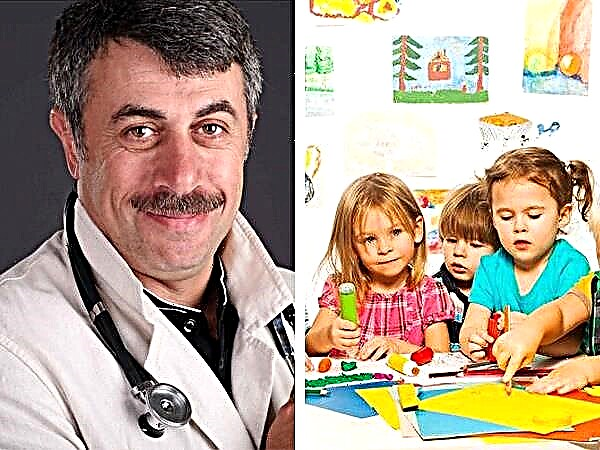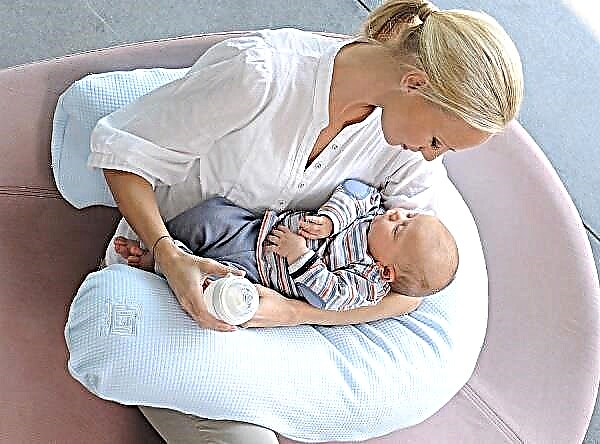
Hiccups occur frequently in children. This is one of the first physiologically actions that a child "masters" while still in the womb. A baby's hiccups usually do not cause concern for parents - if it does not occur several times a day and with prolonged intractable attacks. After reading this article, you will learn why hiccups occur and how to help your child.


What it is?
Hiccups are diaphragmatic cramps, contractions of the diaphragm and intercostal muscles, which are jerky in nature. These movements always occur serially and give unpleasant sensations. With such movements of the diaphragm, external respiration is disturbed. This happens due to the fact that muscle contractions imitate inhalation, and the epiglottis sharply "slams", creating the effect of suffocation.
When the air is blocked, the very sound is created that gave the name to this physiological phenomenon - ik. It is believed that in this way the body is freed from the air that has entered the stomach. However, pathological hiccups have completely different roots - it can be tumors, and diseases of the nervous system, and inflammatory processes occurring in internal organs.
These options have nothing to do with fetal hiccups in the womb. There are usually several reasons for the occurrence of such hiccups - from physiological (swallowing amniotic fluid) to idiopathic (inexplicable from the point of view of science).

Kinds
A child's hiccups can be different, and it is important for parents to learn to distinguish normal hiccups from a painful condition:
- Episodic (periodic) hiccups. It is completely safe. In everyday life, such attacks happen to all children without exception.
- Periodic hiccups usually goes away by itself (within a few minutes, maximum - half an hour). It is caused by quite ordinary things - overeating, hypothermia, fear.
Hiccups in children can even begin from prolonged intense laughter:
- Frequent and prolonged hiccups. It can be a signal of various disorders in the body. The daily long hiccuping, which harass the child and which cannot be eliminated by conventional measures, requires examination by specialists.
- Idiopathic hiccups. This kind of hiccups is very rare. It does not fit into the periodic framework, since it happens quite often, but it also does not have any pathological prerequisites. Doctors cannot make a diagnosis because the cause of the reflex contraction of the diaphragm remains unclear.

Causes of occurrence
The causes of hiccups are not fully known to modern medicine and science. However, there are generally accepted beliefs about why a baby hiccups. At different ages, the causes of hiccups can be different.

In babies during pregnancy
Although this phenomenon is more than mysterious, it is not a pathology and the expectant mother should not be a cause for concern. Intrauterine hiccups do not give the child unpleasant or painful sensations, suffering.
At the end of the first trimester, the fetus begins to suck the thumb, and a swallowing reflex is formed. There is nothing strange in the fact that the baby swallows the amniotic fluid surrounding it. Sometimes the amount swallowed exceeds the child's capabilities, the stomach overstretches, and the baby begins to get rid of the excess, belching and rejecting water through diaphragmatic contractions.

It is believed that the taste of amniotic fluid also affects the frequency of hiccups - the more a mother indulges herself with sweets, the more pleasant the taste of amniotic fluid is for the baby. He will swallow more tasty waters.

Another possible reason, which has no scientific confirmation, is that hiccups are a kind of training in performing breathing movements, which then (after birth) will be natural and involuntary.
The version that the baby in the womb may hiccup due to hypoxia (oxygen deficiency) is perceived critically by neonatologists. Indirectly, such a pathological condition may be indicated by a change in the behavior of the fetus (an increase or decrease in movements, including an increase in the frequency of hiccups), but a direct relationship with hiccups has not yet been established.


In newborns and infants
In newborns and infants, the hiccupping process is usually associated not with digestion, but with the formation of the nervous system. Such hiccups are also not a pathology and a reason for an urgent medical examination. It does not bother the child very much, it is a temporary phenomenon.

In addition, babies who have recently been born are greatly influenced by external stimuli, which adults and older children simply do not pay attention to. These are, for example, temperature drops.
With hypothermia, the baby reflexively begins to hiccup, and this process has nothing to do with digestion.

But overfeeding, to which many caring parents are prone, is just directly related to the contraction of the diaphragm. In addition, babies often swallow air when sucking and swallowing.
Overexcitation of the vagus or phrenic nerve can also cause infant hiccups. This may be possible as a result of stress, an abundance of impressions, tension of the nervous system. If there are a lot of guests in the house, noisy, too bright light, loud music, the child cannot get enough sleep - all this can cause a sudden attack of hiccups.


Thirst, loud laughter, too active games with parents, in which the child literally "forgets how to breathe" (throwing the baby into the air, for example), can also cause hiccups in the baby.
All these reasons are physiological, they do not carry danger in themselves - and with the provision of correct first aid, they pass quickly enough.

In children over 1 year old
In children beyond infancy, reflex contractions of the diaphragm can be caused by improper nutrition - a large amount of food, a bad habit of eating dry food, eating hastily, swallowing food in large chunks, a small amount of fluid consumed. If the child does not follow the drinking regime, drinks too little water, then he hiccups, as a rule, much more often.

The vagus nerve passing through the diaphragm can become pinched if the child is uncomfortable. He will most likely begin to hiccup when he takes a very sharp breath during a strong fright. All these reasons are safe for the child and do not require special medical attention.

Signs of illness
Painful diaphragmatic spasms can be observed with ailments associated with significant disturbances in the work of the central nervous system (CNS). This happens, for example, with encephalitis or meningoencephalitis. Sometimes rhythmic contractions of the diaphragmatic septum develop against the background of a hepatic, renal or diabetic coma.


Injuries sustained by traumatic brain injury, concussion, and brain injury can also serve as a trigger for prolonged and debilitating attacks of hiccups, which will return with enviable consistency.

Sometimes pathological hiccups are a harbinger of a critical increase in intracranial pressure. It so happens that it develops against the background of pinched nerve endings in the fourth cervical vertebra, against the background of lymphogranulomatosis, as well as tumors of the esophagus.
Often, painful hiccups are caused by gastritis and inflammation of the duodenum, intestinal obstruction, and gallbladder disease. Help:

To the fetus
The baby in the womb does not need help with hiccups. Rhythmic "tapping" in the stomach is more disturbing to the expectant mother herself than to her child. If the hiccups of the fetus interfere with rest and sleep, a woman can take a walk in the fresh air, do breathing exercises, and take a knee-elbow position for 10-15 minutes. This usually calms the child somewhat and brings the woman the long-awaited peace.

Newborn and baby
A baby with hiccups can be given a small amount of warm water to drink. After eating, to prevent regurgitation and prevent hiccups, you need to hold the child upright for some time, so that the air that gets into the stomach and esophagus during feeding comes out with a belch.
Laying out on the tummy will help eliminate an attack of hiccups in a baby. If the child hiccups due to hypothermia, then he should be rewarmed as soon as possible. As soon as he gets warm, the hiccups will stop.
If the child begins to hiccup due to fear, strong emotional shock, too active games or continuous laughter, he needs to be reassured as soon as possible, his attention should be switched to something calmer, and he should be given a small amount of warm water to drink.


Child over a year old
You can quickly stop an attack of hiccups by straightening the diaphragm. To do this, take a deep, slow breath. You need to hold the air inside the lungs for as long as possible and exhale slowly. If necessary, this exercise is repeated several times.
An older child can quite successfully cope with a more difficult task - to take several small sips of water while holding his breath. This method also allows you to quickly get rid of hiccups.

In some cases, sour berries and fruits (cranberries, red currants, lemon or tangerines) help with hiccups. However, this method can be used only if you are completely sure that the child does not have stomach and intestinal diseases, as well as a tendency to allergic reactions.
Switching attention to a new activity helps to get rid of hiccups. If at the moment of an attack you show the child something interesting, let him look at it, carry him away, then the diaphragm spasms pass suddenly and very quickly.
With pathological hiccups
Help with pathological hiccups at home usually does not bring the desired result. Even if the parents manage to calm the child down, warm him up and give him water, give mild sedatives, the attack repeats over and over again.
The best help for such an attack is to see a pediatrician. This specialist will be helped by the possibilities of modern diagnostics and doctors of other specialties - a gastroenterologist, a neurologist, a cardiologist, a neurosurgeon. Most cases of unhealthy hiccups go away after the child receives the necessary treatment for the underlying condition.

Interesting Facts
How little-studied phenomenon hiccups are overgrown with myths and prejudices, and are also associated with it curious facts:
- At the beginning of the 20th century, an unusual way of dealing with hiccups was practiced in Italy. While the whole world was breathing deeply, drinking water and eating lemons, Italians came up with the idea of sticking out their tongue when hiccupping. And they tried to do this to the maximum length. Judging by the fact that the fact has reached our days, it helped Italian children and adults.
- In 2006, Francis Fesmire (an American physician at the University Hospital of Florida) and three colleagues from Israel invented massage for hiccups. They found out and substantiated that rectal finger massage helps to get rid of an attack as quickly as possible. For this great discovery, the American doctor and his comrades were awarded the Shnobel Prize for the most ridiculous achievements in the field of medicine.
- The longest hiccups in world history was recorded in 1922 (in the USA). Charles Osborne decided to slaughter the pig - and at that moment he began to hiccup. The hiccups lasted exactly 68 years. The man had to hiccup about 400 million times. The treatment was ineffective. However, Osborne was able to marry and have children - despite the constant diaphragmatic spasm.
- In Russia, there is the following belief: when a person hiccups, someone remembers him. If, at the moment of an attack, you begin to sort out the names of acquaintances and friends who could do this at the moment, then the hiccups will stop when the correct name is called. This belief does not have a scientific substantiation base.

Why do newborns hiccup after feeding? Look for the answer to this question in the next video.



